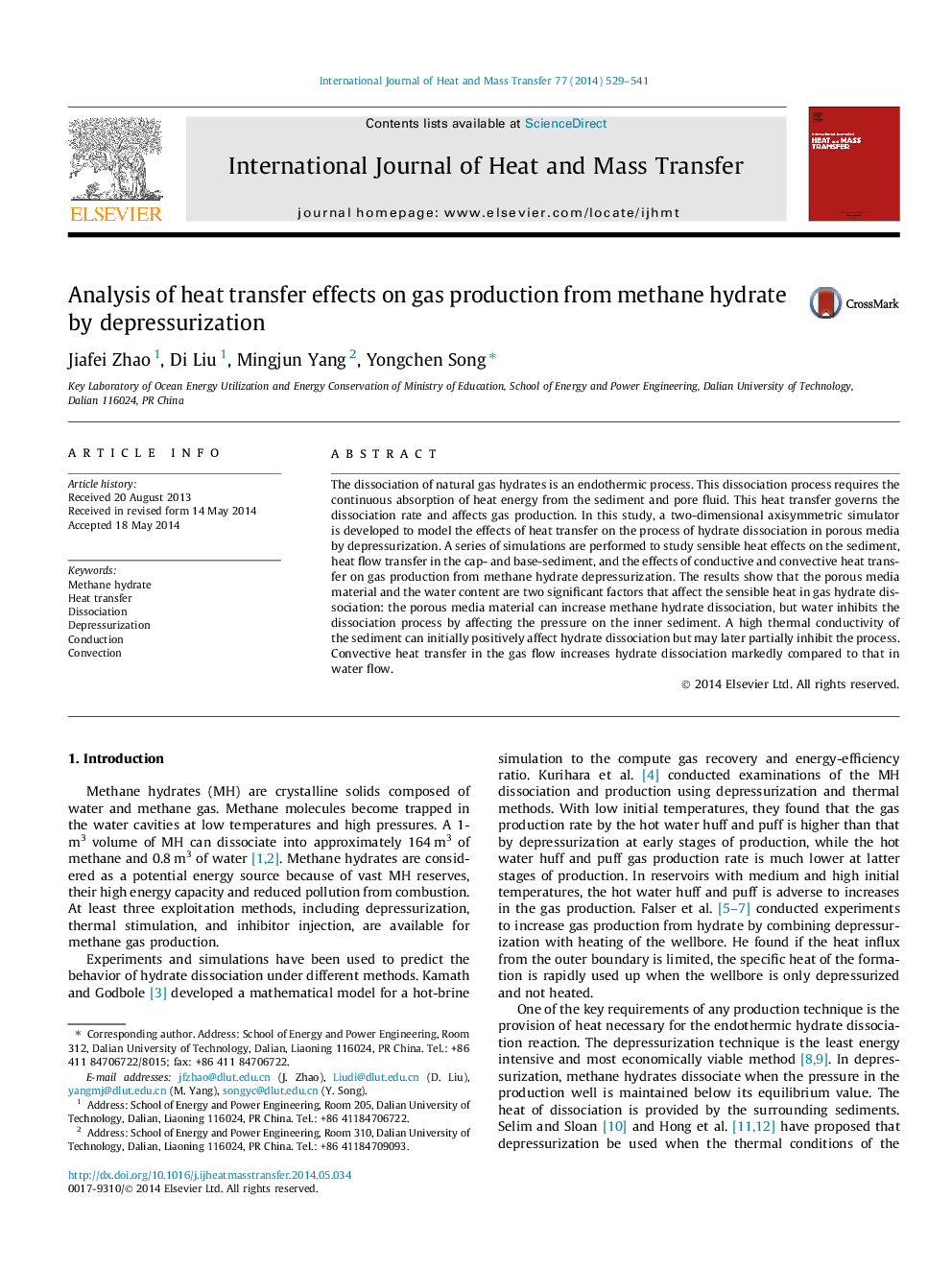| کد مقاله | کد نشریه | سال انتشار | مقاله انگلیسی | نسخه تمام متن |
|---|---|---|---|---|
| 657812 | 1458065 | 2014 | 13 صفحه PDF | دانلود رایگان |
عنوان انگلیسی مقاله ISI
Analysis of heat transfer effects on gas production from methane hydrate by depressurization
ترجمه فارسی عنوان
تجزیه و تحلیل اثرات انتقال حرارت بر تولید گاز از هیدرات متان توسط کمپرسور
دانلود مقاله + سفارش ترجمه
دانلود مقاله ISI انگلیسی
رایگان برای ایرانیان
کلمات کلیدی
هیدرات متان، انتقال گرما، انحلال، کاهش فشار، هدایت، همرفت،
ترجمه چکیده
جداسازی هیدراتهای گاز طبیعی یک فرایند اندوترمی است. این فرایند جداسازی نیاز به جذب مستمر انرژی گرمایی از رسوب و مایع منفذ دارد. این انتقال حرارتی نرخ تبخیر را کنترل می کند و بر تولید گاز تاثیر می گذارد. در این مطالعه یک شبیه ساز محور دو بعدی برای مدل سازی اثرات انتقال حرارت در فرایند جداسازی هیدرات در رسانه های متخلخل بوسیله کمپرسازی توسعه داده شده است. یک سری از شبیه سازی ها برای بررسی اثرات گرمای حساس در رسوب، انتقال جریان گرما در سرپوش و پایه رسوب و اثرات انتقال گرما هدایت و کنتاکت بر تولید گاز از طریق کاهش فشار هیدرات متان انجام می شود. نتایج نشان می دهد که ماده رسانه متخلخل و محتوای آب دو عامل مهم است که بر گرما حساس در تفکیک هیدرات گاز تأثیر می گذارد: مواد رسانه متخلخل می توانند از هم گسیختگی هیدرات متان افزایش یابند، اما از طریق تأثیر فشار بر رسوبات داخلی، . هدایت حرارتی بالا رسوب می تواند در ابتدا مثبت بر هیدرات اختلاط را تحت تاثیر قرار دهد، اما بعدا ممکن است بخشی از این روند را مهار کند. انتقال گرمای هم انباشت در جریان گاز باعث افزایش غلظت هیدرات در مقایسه با جریان آب می شود.
موضوعات مرتبط
مهندسی و علوم پایه
مهندسی شیمی
جریان سیال و فرایندهای انتقال
چکیده انگلیسی
The dissociation of natural gas hydrates is an endothermic process. This dissociation process requires the continuous absorption of heat energy from the sediment and pore fluid. This heat transfer governs the dissociation rate and affects gas production. In this study, a two-dimensional axisymmetric simulator is developed to model the effects of heat transfer on the process of hydrate dissociation in porous media by depressurization. A series of simulations are performed to study sensible heat effects on the sediment, heat flow transfer in the cap- and base-sediment, and the effects of conductive and convective heat transfer on gas production from methane hydrate depressurization. The results show that the porous media material and the water content are two significant factors that affect the sensible heat in gas hydrate dissociation: the porous media material can increase methane hydrate dissociation, but water inhibits the dissociation process by affecting the pressure on the inner sediment. A high thermal conductivity of the sediment can initially positively affect hydrate dissociation but may later partially inhibit the process. Convective heat transfer in the gas flow increases hydrate dissociation markedly compared to that in water flow.
ناشر
Database: Elsevier - ScienceDirect (ساینس دایرکت)
Journal: International Journal of Heat and Mass Transfer - Volume 77, October 2014, Pages 529-541
Journal: International Journal of Heat and Mass Transfer - Volume 77, October 2014, Pages 529-541
نویسندگان
Jiafei Zhao, Di Liu, Mingjun Yang, Yongchen Song,
